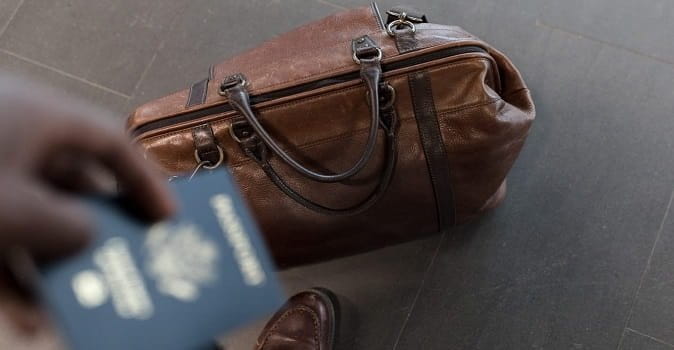
Resources
A Wealth of Informative Articles Designed to Enhance Your Travel Experience
Whether you're seeking tips for safe travel, destination guides, or advice on handling travel emergencies, our resources are organized into easy-to-navigate categories and topics. Dive into the topics that interest you most and discover valuable insights to make your journey smoother and more enjoyable. Explore our diverse range of articles to ensure you're well-prepared for your next adventure.

You may know that travel medical insurance can provide you with coverage in the event of a health emergency abroad. For...

Few destinations around the world draw the kind of inspiration and amazement Japan does. With a seemingly endless...

An Accidental Death and Dismemberment (AD&D) benefit in travel health insurance is exactly what its name suggests: a...

Traveling with a toddler can be overwhelming. That’s why we’ve create a toddler travel checklist you can use for any...

There are three key considerations for most parents who are planning a family trip abroad: (a) keeping your family...

Traveling with young children means watching as your kids are exposed to new cultures, new foods, and new activities....

Family vacations aren’t cheap. On average, according to the 2017 LearnVest Money Habits and Confessions Survey,...

Studying abroad can shift perspectives and broaden horizons in many ways. If you’re looking to further your studies in...

Escape for a while, experience something new, and enjoy times either alone or with family or friends on your next...

Have you spent the last few years asking yourself, “Is it safe to travel right now?” “When will it be safe to travel...

Before you get wrapped up in the more exciting aspects of travel planning, take some time to think about safety. Your...

Traveling to the U.S. on a visitor visa? Perhaps the most daunting step of the entire visa process is the visa...

There are many reasons why working abroad in Europe is the dream of a lifetime for many people. Fortunately, there are...

No one anticipates needing emergency medical care while traveling, but it doesn’t hurt to be prepared just in case....

Planning a trip to the United States on an H-category work visa? You don’t have to go it alone! According to the U.S....

The Visa Waiver Program (VWP) allows citizens who meet specific requirements to travel to the U.S. for approved...

International travel can be exhilarating, whisking you away to different scenery, climates, cultures, and time zones....

While even the most experienced travelers should update their arsenal of travel advice now and then, there are a few...

Before you go abroad, check your destination’s climate, the type of work you’ll be doing, and the clothing customs of...

Close your eyes and imagine being in a place you’ve always wanted to visit. What if you could make that dream a...

The summer season heralds warm weather, longer days, and — for many of us — a longing to escape the daily routine. What...

Women of all ages are taking to the skies, rails, and roads on their own across the globe. For many, it's a matter of...

There are many reasons why a traveler might decide to travel solo. You might be interested in the freedom to go...

If you’re planning an international trip, you're likely on the lookout for travel tips and tricks. There are lots of...

There’s nothing like grabbing a few special people and planning a great friend vacation. Finding the best vacation...

If you’re someone who doesn’t like to stay in one place for too long, it’s possible to do what you love and see the...

Traveling is back on the agenda again for many people, and we couldn't be more excited. People wanting to avoid as much...

Group travel packages make it easier than ever to travel. But don't let the name fool you—there are plenty of packages...

According to the Institute of International Education, the average cost of studying abroad for the 2023-2024 academic...

While many travelers dream about summer vacations, the winter months might be the best time for you to make memories on...

Getting married usually involves months of wedding planning, but that isn't the only thing that requires your attention...

Has preparing for your baby made you worn out and exhausted? These babymoon destinations are perfect for anyone seeking...

Setting sail on your first big international trip or domestic venture can be overwhelming. There is so much to...

Visiting family overseas or traveling for work or school can be very exciting (and nerve wracking). If you’re flying...

There's something so magical about summer vacations. Whether you're flying overseas or heading out on the open road,...

You’re about to embark on a new life journey! What better way to start things than with an epic honeymoon? We know it...

So, you’ve been googling “fall vacation ideas 2024.” But there’s so much information available. Where do you even...

Have you ever dreamed of traveling the world for an extended period, but just didn't know where to start? Joining a...

Choose the city guide for your destination to discover things to do, sights to see, transportation options,...

With the return of post-COVID business travel, employees are reacquainting themselves with work-related trip management...

Whether you’re a high school student studying abroad for a semester or a college undergrad spending four years...

Northern Europe is home to “The Land of Fire and Ice”—also known as Iceland. But don’t be deceived by the name of this...

Wanting a memorable honeymoon is a reasonable desire for any bride and groom, but keeping your dreams in line with your...

In February, when many people are digging themselves out from another snowfall, travelers often dream of someplace...

If you’re planning a trip to Europe, you’ve probably stumbled across the word “Schengen” at some point during your...

Visitors frequently flock to the more well-known tourist destinations of Tokyo, Osaka, and Kyoto, yet the modern port...

There are 26 countries in the Schengen Area and every single one of them has an array of exciting, beautiful, and...

While you’re traveling within the Schengen Area, you’ll probably want to know a little bit about each country. We’ve...

Switzerland remains a popular tourist destination, especially for U.S. citizens. If you are considering a visit to this...

We have collected helpful information about the most commonly asked questions regarding the Schengen visa. The majority...

Have you ever wondered what it’s like to sail along the waters of Australia while taking in the sights? You aren’t...

Europe brings together a multitude of cultures, from the highly traveled, internal cities in the west to the quaint,...

From the Royal Palace and Prado museum in Madrid to the medieval castle and Roman aqueduct in Segovia, Spain offers...

Ready to start planning a Puerto Rico Vacation? Before jetting off, you’ll want to make sure you have planned some...

Whether you're visiting Osaka for the first time or coming back for a special event or occasion, in this Osaka city...

Visit the Home of Amazing Reggae Music, Stunning Resorts, Beautiful Beaches, and Lush Rainforests If you’re looking for...

Considering a trip to these sunny islands for beaching and exploring? While personal preferences vary, there are a few...

Yokohama, Japan, is a can’t-miss destination. Despite living in Tokyo’s shadow, it has a culture and offerings all its...

Who’s ready to study abroad in India? Whether you’re looking for a semester abroad or want to complete your entire...

This guide will give you quick access to all the practical info you need on accommodations, medical facilities,...

If you are looking for an ultra special vacation this summer, check out these great destinations in the USA. There are...

In many ways, Japan is the ideal destination for solo travelers. There are accommodations, dining, and activity options...

Sapporo sits on the west coast of Hokkaido, the northernmost of Japan’s islands. It was established in 1857 with a...

Over the years, millions of individuals have traveled to Japan to enjoy the breathtaking cherry blossoms, indulge in...

Fukuoka is the most populous city on the Northwest Japanese Island of Kyushu. It is also the capital of the Fukuoka...

If you’re preparing to study abroad, you’re probably drowning in the details of your trip. One detail you shouldn’t...

Tuition prices are skyrocketing in the United States. According to data from College Board, between 2005-06 and...

Graduate school. It’s a time to take your education to new heights by specializing in your area of interest. For...

Some people say that having young kids means taking a hiatus from international travel. But having young children...

This blog is part of our accident-prone tourist series. It features letters inspired by real-life travel mishaps faced...

The digital nomad space has grown rapidly since the normalization of remote work that came about following the COVID-19...

Have you ever thought about ditching your 9 to 5 to explore the world with your partner? It's not as challenging as you...

The teach abroad experience presents adventurous, passionate educators with the best of both worlds — the opportunity...

Are you interested in getting a job abroad, but have no idea where to start? Just as the internet has made the process...

Finding a job abroad after college involves more than just booking a plane ticket to your dream destination and setting...

When you're planning to study abroad, it's very important to consider the potential health issues you could encounter...

If the last few years of the COVID-19 pandemic has taught us anything, it’s that staying on top of outbreaks is...

Traveling internationally with your dog might be a dream come true. After all, no one wants to leave man’s best friend...

Volunteering abroad can provide you with invaluable personal and professional experience. However, your volunteer...

From overcrowded airports and flight cancellations to lost luggage and overweight baggage fees, the hassles of plane...

You've dreamed of finally taking a break from your day-to-day life to travel abroad and experience different countries...

Finding a travel destination may be the hardest step when planning a vacation. Whether it’s a solo trip, a friends’...

Flying with a baby or toddler can get stressful very quickly. But it’s all about preparation. Know what you need to...

Education at American universities is often very expensive. Federal student aid is usually not offered to international...

Northern lights. Aurora sky. Polar lights. Whatever you call them, they are a beauty of nature worth seeing. Many...

You’ve scheduled your first week-long solo trip to Thailand or are gearing up for a family vacation to the Bahamas....

Whether you're planning a relaxing beach getaway, foodie-themed city escape, or a safari adventure, you always run the...

Students who choose to study abroad make the decision of a lifetime. But the unforgettable experience of studying...

Whether you’re traveling to a single U.S. city or touring the country, you’ll need to know how to get around. Public...

The Exchange Visitor Program is an initiative by the U.S. Department of State to foster cultural exchange between...

Backpacking has never been easier or more enjoyable than it is today. It remains an ideal avenue for cheap and...

Many people have never heard of orienteering, but this woodland exploration sport is highly popular in Europe and is...

You've made the decision to study abroad—perhaps you've even chosen an organization to entrust with your study abroad...

The mundane thought of graduating high school, going to college, and starting a career may leave little room for you to...

Delayed or canceled flights are a travel headache you may have encountered before (or will in the future). This is your...

The Caribbean Islands and other tropical destinations are travel hot spots for their enjoyable weather and relaxing...

Planning for international travel can be complicated and overwhelming. Even experienced travelers can find themselves...

Most people don’t put much thought into packing before they travel. Often, travelers pack their luggage the night...

Drinking contaminated water can increase the risk of developing some infectious diseases. It may lead to days in bed...

Moving to the United States can be a challenging process. In addition to crossing borders and facing potential language...

You came across hostels in your search for a cheaper alternative to hotels or Airbnbs, but you need more information...

Practicing medicine in the United States appeals to many international medical students and doctors, but the U.S....

Preparing to study abroad can be hectic and overwhelming, especially if this is the first time you're going to live in...

Traveling the globe can be the adventure of a lifetime, but sooner or later travelers are bound to run into language...

International citizens are welcome and encouraged to study in the United States, but to do so generally requires a...

Hop on any social media platform and you'll notice how small the world has become. It's shrinking by the minute....

Missionary trips can take you almost anywhere in the world. But before you decide where you want to go for your mission...

Over 400,000 missionaries travel the world each year. While this number has continued to grow over time, so has the...

“To move, to breathe, to fly, to float, to gain all while you give, to roam the roads of lands remote, to travel is to...

If you’re only attending music festivals in your home country, you’re missing out on some of the biggest and best music...

Applying for a visitor visa can be an extremely stressful process. Guidelines often seem unclear and contradicting...

Traveling to, from, and within the United States isn't as simple as hopping on and off a plane. The various departments...

If you become seriously sick or injured while traveling abroad, you’ll likely be taken to the nearest hospital or...

A place that embodies timelessness, Japan is the perfect travel destination to experience the sheer fusion of ancient...

Japan is a great destination for business travelers, students, and tourists alike. There’s a lot to see and do, from...

We all have a desire to travel. But sometimes we need a little motivation to get our wheels turning. These 100+ travel...

College is said to be one of the most exciting times in your life. It’s an opportunity for you to discover your...

There are 26 countries in the Schengen Area and every single one of them has an array of exciting, beautiful, and...

Before visiting the Schengen Area, a region comprised of 26 European nations, many travelers must apply for visas.

As you begin planning for your study abroad venture, it's only natural to anticipate the most glamorous aspects of your...

If you’ve recently obtained a Schengen visa, Europe is your oyster. With the ability to cross through 26 European...

If your 5-year plan includes finding a job overseas, perfecting your English language skills, and having the...

Ecotourism is defined as tourism of exotic, endangered environments usually to support conservation efforts and...

Maybe it's a trip around the world, or a wish to truly immerse yourself in another culture. Perhaps it's a test run...

Travel medical insurance is a necessity for most world travelers, as many standard medical policies will not cover you...

This article was submitted by Goats on the Road, a website aimed at teaching others to turn travel into a lifestyle....

No matter how carefully you prepare for a trip abroad, unexpected situations can still pop up to alter your travel...

This article was submitted by Alex Torres, Chief Marketing Officer of Moovit, a real-time app with everything you need...

This blog is part of our accident-prone tourist series featuring letters inspired by real-life travel mishaps faced by...

Study abroad is a popular way to broaden your education while gaining a first-hand perspective on the world. The...

Visitors to America have so many choices for exciting vacation destinations that it's sometimes difficult to know which...

In the world we live in today, bad things happen, including terrorist attacks in wonderful cities like Paris and...

Tuition prices are skyrocketing in the United States. According to data from College Board, between 2005-06 and...

Are you one of many students from all over the world who has applied to study in the United States- or are you thinking...

When you shop for health insurance, you will come across many different types of policies designed to match your...

Health insurance can be complicated, but it doesn't have to be. Insurers and healthcare professionals often use...

There are thousands of cultural exchange programs all across the globe that can make your dreams of international study...

Studying abroad offers a unique opportunity for college students to broaden their horizons and get a glimpse into the...

Don't even think about a rental car. When traveling Europe, underground train lines, called metros, can take you almost...

You've been looking forward to your trip abroad for months and now you're finalizing the logistical details —...

Many international travelers don't realize how much travel insurance can vary in terms of coverage, billing and...

Whenever you are considering a trip to a new place, it's always a good idea to do research before you leave home. With...

Taking a trip to Alaska is a great opportunity to explore a new part of the world. Filled with wildlife, natural...

The United States offers thousands of travel destinations for families. A trip to Disney is almost a rite of passage...
There are no results for the filtering combination that you have selected.
Please try a different combination or broader filter options. To reset filters, set dropdown filters to the top selection and empty the search field.
Featured

The digital nomad space has grown rapidly since the normalization of remote work that came about following the COVID-19...

Have you ever thought about ditching your 9 to 5 to explore the world with your partner? It's not as challenging as you...
Insurance Education

You may know that travel medical insurance can provide you with coverage in the event of a health emergency abroad. For...

An Accidental Death and Dismemberment (AD&D) benefit in travel health insurance is exactly what its name suggests: a...

Before you get wrapped up in the more exciting aspects of travel planning, take some time to think about safety. Your...
Lists & Tips

Traveling with a toddler can be overwhelming. That’s why we’ve create a toddler travel checklist you can use for any...

There are three key considerations for most parents who are planning a family trip abroad: (a) keeping your family...

Traveling with young children means watching as your kids are exposed to new cultures, new foods, and new activities....
Student Resources

Have you ever dreamed of traveling the world for an extended period, but just didn't know where to start? Joining a...

Whether you’re a high school student studying abroad for a semester or a college undergrad spending four years...

Who’s ready to study abroad in India? Whether you’re looking for a semester abroad or want to complete your entire...
Travel Guides

Few destinations around the world draw the kind of inspiration and amazement Japan does. With a seemingly endless...

Choose the city guide for your destination to discover things to do, sights to see, transportation options,...

Northern Europe is home to “The Land of Fire and Ice”—also known as Iceland. But don’t be deceived by the name of this...

In February, when many people are digging themselves out from another snowfall, travelers often dream of someplace...
How-to Guides

Studying abroad can shift perspectives and broaden horizons in many ways. If you’re looking to further your studies in...

Escape for a while, experience something new, and enjoy times either alone or with family or friends on your next...





